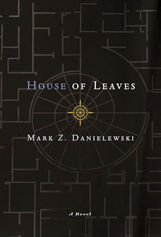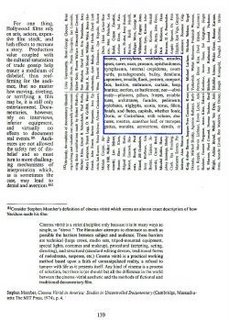House of Leaves
Whoa. So I just finished House of Leaves

It's a (postmodern) horror book, mostly, and that's where you'd find it in the bookstore. To give you a brief synopsis: it's about a guy who discovers that the interior of his house is 3/4 of an inch bigger than the exterior. As he is trying to figure out what's wrong with his tape measure, a door appears in his living room which should lead out into his front yard, but which instead leads into a dark hallway and structure that seems to go on forever. I won't give too much away, but the cover of the book has a giant spiral staircase on it; you can go from there. Here's a hint: it doesn't go up.
This story though, is framed in another story which takes place mostly in the copious footnotes. The narrative structure is as follows: the house story, as told by a documentary film, as described by an academic paper on the film, written by a crazy old man who recently died, as edited by another man who is slowly going nuts, as further edited by the (fictional) publishing company. None of the narrators are particularly reliable, something which is made explicit early on. Each different narrator uses a different font, which spares you from the Faulkerian agony often associated with books with this structure.
The main body of the story, the story of the house, is, like I said, presented as an academic paper written on the (nonexistant) documentary film about it. This is interesting, because it allows the author to make explicit a lot of the symbolism and to delve a lot more deeply into the characters and their motiviations than would ordinarily be possible. It also, as Wikipedia notes, provides a satire on academic criticism. There is a whole chapter, for instance, about why the guy decided to return to the house, after XXXXXXXXXXXXXXX. Another whole chapter on the entymology of the word "echo," as well as the scientific and mythological background of the concept.
This is both good and bad. It is good in that it forces you to think a little more about the story then you ordinarily would outside of an English class, and it is good in that it provides an effective way to raise the suspense (by being written under the assumption that everyone has already seen the movie and knows what will happen), but it is also bad in that sometimes it gets a bit dull. There's a lot of overanalysis in there, which I think is intentional, but is also kind of tedious at points.
The other half of the story, carried out in the footnotes, is about the editor of the book as he takes lots of drugs, has lots of sex, and slowly decends into madness. This part is, much of the time, similarly tedious, but it is (arguably) the most important part of the story, depending on your interpretation. It is cut up into small chunks and spaced out enough that it is bearable. Most of my dislike for these sections I think stems from the fact that they kept me away from exploring the house. Lots of sex, drugs, and rock and roll in these parts, though, so buyer beware.
Then, there's the actual physical structure of the book. It is crazy. As I mentioned, each narrator is in a different font. The long and numerous footnotes have footnotes which have footnotes. Sometimes there are only 5 words on a page, sometimes there are a gajillion. Sometimes the words are upside down, sometimes they are written backwards, sometimes entire pages have the strikethru tag applied to them. Other parts are missing entirely, sometime words or parts of words are missing (the original manuscript has been burned, or scratched out). Sometimes all of these things happen at the same time. And then there's the fact that "house" is always in blue.

The formatting is usually done with a purpose, not just to be annoying. At one point the characters are lost in the neverending tunnels and as they become more and more panicked and disoriented, the text becomes more dense and convuluted until you are as lost as the characters. It sounds kind of stupid, but in practice it was really effective.
There's a lot to this book; apparently it took the author 10 years to write it. You can read the book and think you got most everything out of it, and then read the Wikipedia article on it and realize that you missed like half of the stuff (including secret messages encoded in the text). (PS: like me).
It has an interesting and creepy story that keeps you going, and it also makes you think without being too dense to be an enjoyable bedside read. I would recommend this to anybody that thinks they can persevere through it; it's not an easy book to read, but it's easy enough, and it is pretty interesting. Also it makes you feel smart. Who can argue with that?
(House of Leaves


0 Comments:
Post a Comment
<< Home